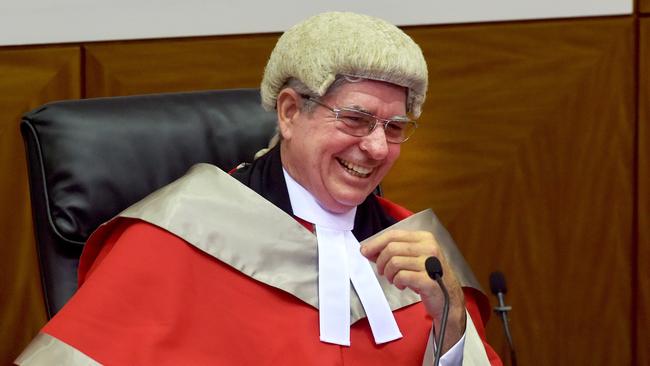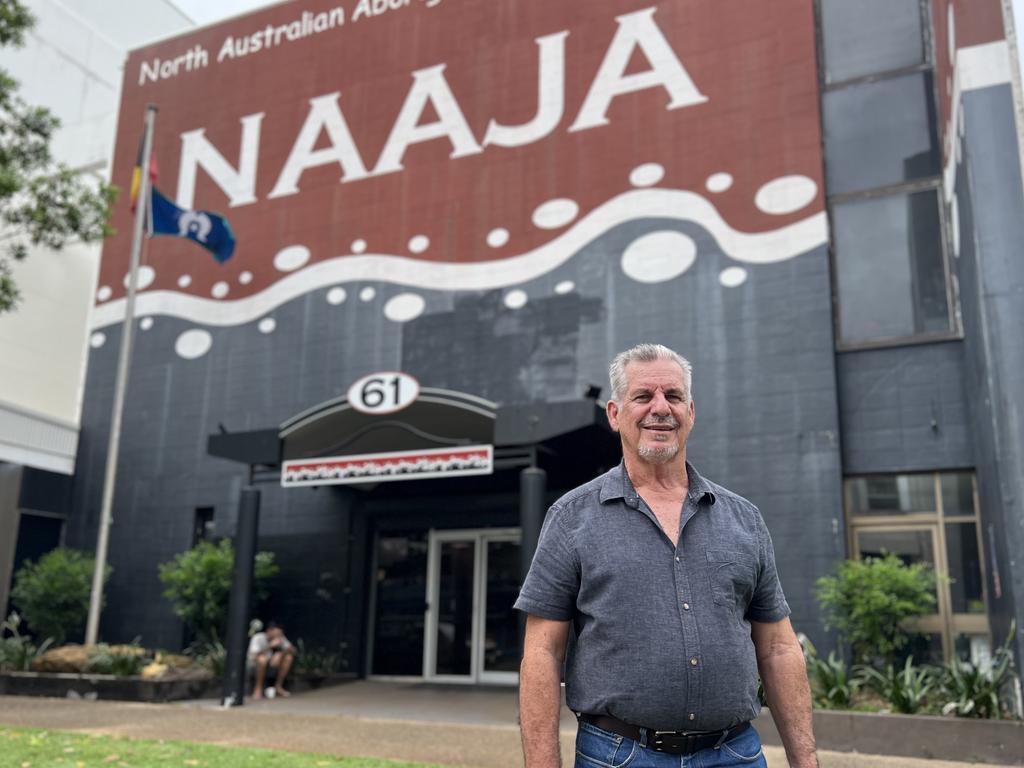Self-represented Aboriginal offenders in Alice Springs making ‘pleas of convenience’: NT chief judge Michael Grant
The NT’s chief judge has pleaded with lawyers to come to one of Australia’s most dangerous jurisdictions to help a devastating staffing shortage.

The Northern Territory’s chief judge has made a plea for lawyers to come to one of Australia’s most remote jurisdictions to help resolve a legal staffing shortage, as Aboriginal people accused of serious crimes are left without representation and have to fend for themselves in court.
In his first comments since Alice Springs became crippled under a catastrophic legal staffing shortage because of a mass exodus from the North Australian Aboriginal Justice Agency, NT Chief Justice Michael Grant said it was commonplace for Aboriginal defendants who didn’t speak English to represent themselves in court, and they were regularly forced to make “pleas of convenience” just to get off remand.
His comments follow extensive reporting in The Australian about claims of corruption, fraud, bullying and drug use within the NAAJA. Amid these allegations, staff have left the organisation in droves, leaving it chronically short-staffed.
Chief Justice Grant said during his Opening of the Legal Term speech that at the most recent criminal directions hearings conducted in Alice Springs, there were 20 self-represented defendants, nearly all of whom “were remanded in custody and almost all of whom did not speak English as their first language”.
He said these self-represented defendants had not read the briefs filed against them by the prosecution “because the only means of contact was through a generic prison email address, which is entirely inadequate for the purpose of prosecution disclosure”.
“Even had the prosecution briefs been received, the defendants had no ability to properly review – or even read – that material, and no recourse to explanation or advice,” he said.
“Many of these defendants are forced to the position of making pleas of convenience in order to get off remand so that they can either be released or transferred into the general prison population.”
Chief Justice Grant said the “difficulties” faced within the NAAJA had placed “additional burdens on the NT Legal Aid Commission, which is obviously not staffed or funded to assume the NAAJA caseload”.
While he did not wish to add to the current commentary regarding the distribution of NAAJA funding, Chief Justice Grant said there was a “crucial place for structured legal aid services in the administration of justice”.
“Without properly funded and functioning legal aid services, the administration of criminal justice would quickly come to a grinding halt,” he said.
“That is demonstrated by the current situation in Alice Springs following the suspension of some legal aid services there.”
Chief Justice Grant’s comments come as the Albanese government continues to inject funds into the protection of Indigenous communities in the NT, this week announcing a $1bn boost to educate struggling Aboriginal students and give teachers a pay rise.
The Prime Minister has also introduced a 10-year, $4bn remote housing package to build hundreds of homes in Indigenous communities.
Chief Justice Grant said Alice Springs was struggling to attract “appropriately employed lawyers” because of several factors, including the “recent spate of negative reporting on social disorder in the town”. The inability to attract good talent was a “relatively recent phenomenon”, he said, encouraging those in metropolitan areas to come to central Australia to lend their services and reap the benefits of experience gained.
“Without seeking to understate the significance of difficulties … present in Alice Springs, the same professional satisfactions and advantages of practising in Alice Springs remain,” he said.
“It remains a unique and beautiful place to live – a place of stunning landscapes, a richly diverse community, a vibrant cultural scene. That is the message which as a profession and as a community we should be communicating about the attractions, advantages and satisfactions of legal aid work throughout the Northern Territory, and particularly in Alice Springs.”
NT Bar Association president Mary Chalmers SC told The Australian the mass exodus of NAAJA staff had left Legal Aid NT to cover “a critical lawyer shortage and (it had) had to prioritise certain client groups including children, people in custody for a first court mention, and people facing serious indictable charges”.
“As a result, many First Nations Territorians who do not speak English as their first language are appearing unrepresented in the Local Court. This carries a real risk miscarriages of justice have occurred and are occurring,” she said. “It is important to note that the time taken in dealing with unrepresented defendants also creates a drain on scarce court, prosecutorial and police resources at a time when demands on those resources are increasing.”
Ms Chalmers indicated that the NT’s bail laws, which require a defendant to prove why they should receive bail rather than assuming they are entitled to it, creates “a risk unrepresented people will be unnecessarily remanded”.
“Our bail laws together with mandatory sentencing provisions elevate existing risks from over-incarceration of First Nations Territorians, overcrowding in our prisons, and lack of sufficient rehabilitation opportunities within the correctional environment, especially at the remand stage.”
NAAJA resumed taking on new youth clients last week, after operations were suspended in November. A spokesperson said the resumption of youth cases would be “closely followed” by adult matters, starting with those in custody.








To join the conversation, please log in. Don't have an account? Register
Join the conversation, you are commenting as Logout